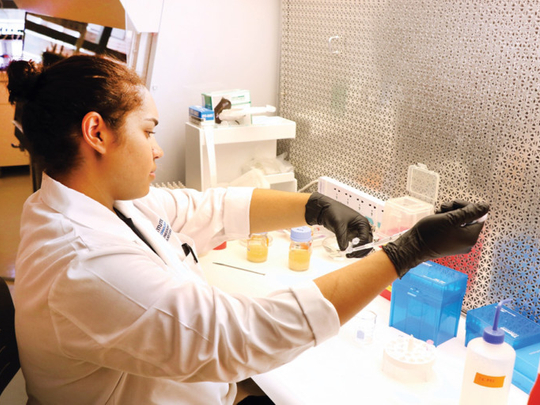
Abu Dhabi: New research at Masdar Institute of Science and Techology is working to create microbial soil conditions in the UAE to help boost domestic farming crops and slash water-intensive agricultural operations.
Masdar says its “novel innovation” will see UAE sand and soil enriched with microbes that would be slowly released from micro-biodegradable polymer spheres.
The spheres — measuring roughly a millimetre across — comprised mainly alginate, a compound that breaks down in the environment within six to 20 days, said Dr Hector Hernandez, Assistant Professor of Chemical Engineering at Masdar.
“Biodegradable polymers derived from natural sources have been used on a worldwide scale and have also been approved for food and human use by many governmental bodies. Alginate is used in many food and pharmaceutical applications and is readily available for use,” Dr Hernandez told Gulf News.
Dr Fernandez is acting as adviser to UAE national graduate student Fatima Al Jallaf, whose soil fertility enhancing project is expected to improve the UAE’s ability to support farming by spreading microbes through the soil through the polymer capsule delivery method and improve the UAE’s ability to sustainably support crops.
Fatima said she believes her work can help convert arid sand and soil in the UAE into more productive farming land to help increase domestic food security through locally grown produce.
“Healthy soil is teeming with millions of microorganisms who perform a variety of functions, such as removing toxins and storing carbon. The problem with the UAE’s desert soil is that it is largely devoid of carbon sources and these helpful microorganisms. We are trying to bring these growth-promoting bacteria into the soil with this ... research,” Fatima said.
Fatima noted that the UAE’s soil and its high sand and low nutrient content is not the best environment for producing crops.
Sandy soil draws far higher quantities of water to grow food with as much as 70 per cent of the UAE’s water consumed by irrigation.
“These biodegradable polymer spheres need to be able to survive and operate in the UAE’s harsh environment and these beads need to be populated with local indigenous microbial species to prevent any import of non-native biological agents. This is a very complex set of factors that needs to be met before any product is tested in a closed system designed to mimic the UAE environment. After all of these experiments and trials, then there needs to be an assessment of the effects of large scale deployment of these systems,” Dr Hernandez said.
“This is what makes Fatima’s research so challenging but, at the same time, so exciting. We need to be able to develop biodegradable compounds that can serve as microcosms for soil regenerating microbial communities,” he said.
Fatima and Dr Hernandez said they are working with Dr Pance Naumov, from New York University Abu Dhabi and his postdoctoral associate, Dr Lidon Zhang, to come up with the best sodium alginate capsule that can withstand the harsh desert conditions in order to help disperse microbes through the soil.












